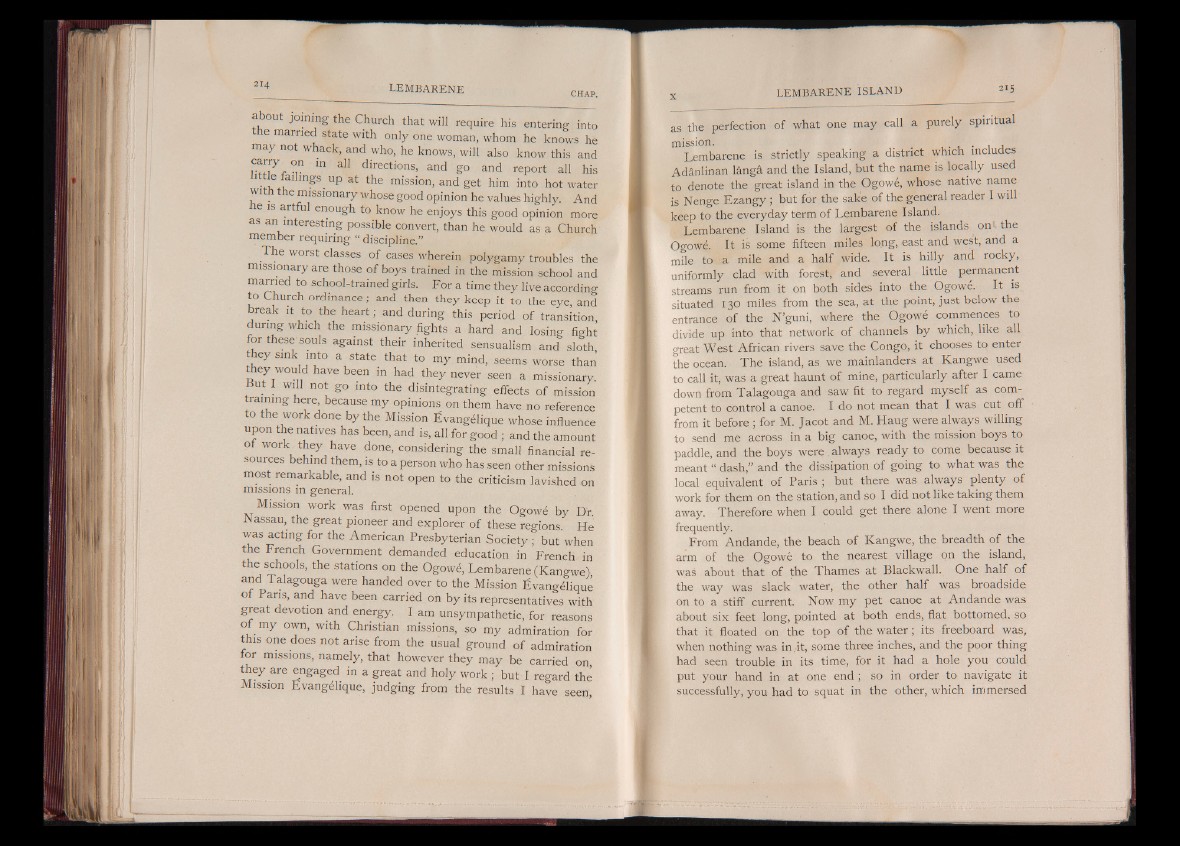
about joining the Church that will require his entering into
the married state with only one woman, whom he knows he
may not whack, and who, he knows, will also know this and
in T directions> and go and report all his
failings up at the mission, and get him into hot water
with the missionary whose good opinion he values highly. And
e is artful enough to know he enjoys this good opinion more
as an interesting possible convert, than he would as a Church
member requiring “ discipline.”
The worst classes of cases wherein polygamy troubles the
missionary are those of boys trained in the mission school and
married to school-trained girls. For a time they live according
to Church ordinance ; and then they keep it to the eye, and
break it to the heart ; and during this period of transition
during which the missionary fights a hard and losing fight
for these souls against their inherited sensualism and sloth
they sink into a state that to my mind, seems worse than
they would have been in had they never seen a missionary.
ut will not go into the disintegrating effects of mission
training here, because my opinions on them have no reference
to the work done by the Mission Évangélique whose influence
upon the natives has been, and is, all for good ; and the amount
of work they have done, considering the small financial resources
behind them, is to a person who has seen other missions
most remarkable, and is not open to the criticism lavished on
missions in general.
Mission work was first opened upon the Ogowé by Dr
Nassau, the great pioneer and explorer of these regions. He
was acting for the American Presbyterian Society ; but when
the French Government demanded education in French in
the schools, the stations on the Ogowé, Lembarene (Kangwe)
and Talagouga were handed over to the Mission Évangélique
o f Paris, and have been carried on by its representatives with
great devotion and energy. I am unsympathetic, for reasons
o f my own, with Christian missions, so my admiration for
this one does not arise from the usual ground of admiration
for missions, namely, that however they may be carried on
they are engaged in a great and holy work ; but I regard thé
Mission Evangélique, judging from the results I have seen,
as the perfection of what one may call a purely spiritual
mission. _ , - i • i j
Lembarene is strictly speaking a district which includes
Ad&nlinan langi and the Island, but the name is locally used
to denote the great island in the Ogowe, whose native name
is Nenge Ezangy ; but for the sake of the general reader I will
keep to the everyday term of Lembarene Island.
Lembarene Island is the largest of the islands on- the
Ogowe. It is some fifteen miles long, east and west, and a
mile to a mile and a half wide. It is hilly and rocky,
uniformly clad with forest, and several little permanent
streams run from it on both sides into the Ogowe. It is
situated 130 miles from the sea, at the point, just below the
entrance of the N’guni, where the Ogowe commences to
divide up into that network of channels by which, like all
great West African rivers save the Congo, it chooses to enter
the ocean. The island, as we mainlanders at Kangwe used
to call it, was a great haunt of mine, particularly after I came
down from Talagouga and saw fit to regard myself as competent
to control a canoe. I do not mean that I was cut off
from it before ; for M. Jacot and M. Haug were always willing
to send me across in a big canoe, with the mission boys to
paddle, and the boys were always ready to come because it
meant “ dash,” and the dissipation of going to what was the
local equivalent of Paris ; but there was always plenty of
work for them on the station, and so I did not like taking them
away. Therefore when I could get there alone I went more
frequently.
From Andande, the beach of Kangwe, the breadth of the
arm of the Ogowe to the nearest village on the island,
was about that of the Thames at Blackwall. One half of
the way was slack water, the other half was broadside
on to a stiff current. Now my pet canoe at Andande was
about six feet long, pointed at both ends, flat bottomed, so
that it floated on the top of the water; its freeboard was,
when npthing was in.it, some three inches, and the poor thing
had seen trouble in its time, for it had a hole you could
put your hand in at one end ; so in order to navigate it
successfully, you had to squat in the other, which immersed